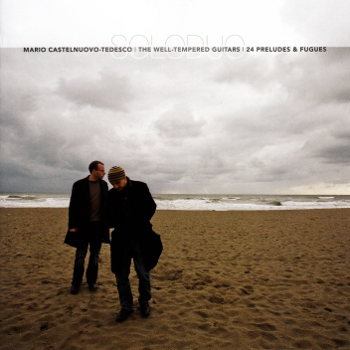CD REVIEWS
SoloDuo (Matteo Mela and Lorenzo Micheli, guitars).
Mario Castelnuovo-Tedesco {:]The Well-Tempered Guitars{:]
24 Preludes and Fugues. Solaria Sol201201, 2012 (two discs).
Any new recording by SoloDuo is a cause for celebration, especially when they release what is likely to be a definitive account of an important work. (I have not heard the complete recording by the brilliant Brasil Guitar Duo; the honor of "definitive" might well be shared!)
Castelnuovo-Tedesco was inspired by the great Ida Presti and Alexandre Lagoya, writing forty-eight pieces in the amazing span of just a few months in 1962. Sadly, Presti and Lagoya were able to record only the E-major pair before Presti's tragically early death in 1967. The music is amazingly inventive. Despite the rapidity of its composition, Tedesco doesn't repeat himself and every piece sounds fresh. The compositional requirement of using many keys, which seldom occur in the guitar literature, likely reduced the use of cliches.
Since we are dealing with fifty works here-the duo includes the Fuga elegiaca written after Presti's death-I shall nor attempt description of the individual pieces. Lorenzo Micheli's admirable notes give a good overview of the composer's approaches. Nonethe less, I must mention a few special favorites.
Disc 1: The A-minor prelude has a wonderful series of rapid
undulating lines with occasional moments of repose leading into a lyrical fugue. The E-major set (recorded by Presti and Lagoya) begins with a beautiful melody over a rapid arpeggio accom paniment leading to a very Italian section and then to a light hearted bourree fugue. The quite unexpected B-Har major prelude is a rumba with a very ''Tedescan" burlesque match as its fugue. The F-minor set is an eerie and sad pair of considerable depth.
Disc 2: The opening G-major prelude is a wonderful series of arabesques leading ro a conversational fugue shared by the guitars. The rather Scottish sounding A-major prelude is inspired by the Whitman poem, "I Hear America Singing." (Really.) Another poem, this rime by Elizabeth Barrett Browning, is the inspiration for the E-flat major prelude. Its fugue is a whimsical siciliana. Rapid passages run throughout the Allegretto mejistofelico B-Har minor prelude and lend a devilish charm to the fugue as well.
As the set concludes, the improvisando melody of the C-minor prelude sounds like a bit of Django Reinhardt at the beginning, then becomes a rather strict fugue subject, showing its versatility. Despite the above citations, be assured there are no "duds" in the set. It is a remarkable compositional achievement. The performers' achievement is on an equal level, every work ideally realized and beautifully played. The recorded sound does nor let down the enterprise at all, being both warm and derailed.
-AI Kunze
SoloDuo (Matteo Mela and Lorenzo Micheli, guitars).
Mario Castelnuovo-Tedesco {:]The Well-Tempered Guitars{:]
24 Preludes and Fugues. Solaria Sol201201, 2012 (two discs).
Any new recording by SoloDuo is a cause for celebration, especially when they release what is likely to be a definitive account of an important work. (I have not heard the complete recording by the brilliant Brasil Guitar Duo; the honor of "definitive" might well be shared!)
Castelnuovo-Tedesco was inspired by the great Ida Presti and Alexandre Lagoya, writing forty-eight pieces in the amazing span of just a few months in 1962. Sadly, Presti and Lagoya were able to record only the E-major pair before Presti's tragically early death in 1967. The music is amazingly inventive. Despite the rapidity of its composition, Tedesco doesn't repeat himself and every piece sounds fresh. The compositional requirement of using many keys, which seldom occur in the guitar literature, likely reduced the use of cliches.
Since we are dealing with fifty works here-the duo includes the Fuga elegiaca written after Presti's death-I shall nor attempt description of the individual pieces. Lorenzo Micheli's admirable notes give a good overview of the composer's approaches. Nonethe less, I must mention a few special favorites.
Disc 1: The A-minor prelude has a wonderful series of rapid
undulating lines with occasional moments of repose leading into a lyrical fugue. The E-major set (recorded by Presti and Lagoya) begins with a beautiful melody over a rapid arpeggio accom paniment leading to a very Italian section and then to a light hearted bourree fugue. The quite unexpected B-Har major prelude is a rumba with a very ''Tedescan" burlesque match as its fugue. The F-minor set is an eerie and sad pair of considerable depth.
Disc 2: The opening G-major prelude is a wonderful series of arabesques leading ro a conversational fugue shared by the guitars. The rather Scottish sounding A-major prelude is inspired by the Whitman poem, "I Hear America Singing." (Really.) Another poem, this rime by Elizabeth Barrett Browning, is the inspiration for the E-flat major prelude. Its fugue is a whimsical siciliana. Rapid passages run throughout the Allegretto mejistofelico B-Har minor prelude and lend a devilish charm to the fugue as well.
As the set concludes, the improvisando melody of the C-minor prelude sounds like a bit of Django Reinhardt at the beginning, then becomes a rather strict fugue subject, showing its versatility. Despite the above citations, be assured there are no "duds" in the set. It is a remarkable compositional achievement. The performers' achievement is on an equal level, every work ideally realized and beautifully played. The recorded sound does nor let down the enterprise at all, being both warm and derailed.
-AI Kunze



